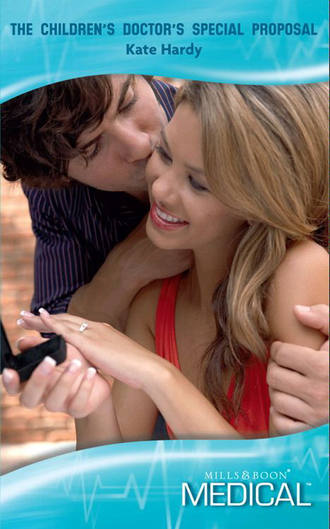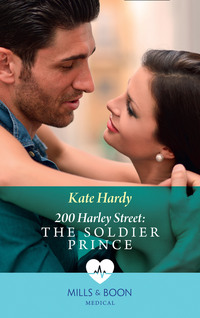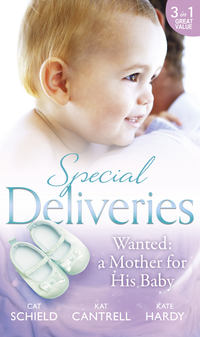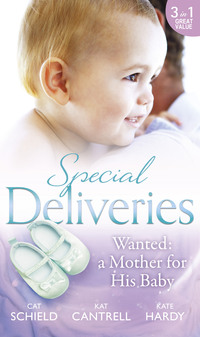
Полная версия
The Children's Doctor's Special Proposal
She groaned. ‘Don’t tell me your wife and kids find them for you, too.’
‘Not married. No kids. No intention of having either.’
His voice was suddenly cool, breaking the light-hearted mood, and Katrina winced inwardly. Hadn’t Lynne said yesterday that the man was very guarded about his private life? ‘Sorry. I wasn’t fishing. Just that Will always says his wife and kids buy his loudest ties, and I assumed if you had a collection like his it’d be from the same kind of source.’ She raked a hand through her hair. ‘Look, I didn’t mean to pry. I apologise.’
‘No offence taken.’
But that invisible barrier was back between them again. And this time it felt a tiny bit wider.
Katrina tried her best to keep it professional in the assessment unit, though she was very much aware of Rhys’s presence—far more than she usually was with Tim or whoever else worked with her. Even when her back was to the room, she knew the precise moment that Rhys left his cubicle and went to call his next patient. And that was worrying. Why was she so aware of the man?
Her third patient that morning worried her even more. Petros was six, and looked very poorly.
‘He’s been a bit off-colour for the last two days, tired and feeling sick,’ his mother said. ‘And his back hurts.’
‘His temperature’s up and he’s a bit short of breath,’ Katrina observed.
Mrs Smith nodded. ‘And his wee’s very dark, even though I’ve tried to get him to drink plenty of water.’
The little boy had olive skin but there was a definite pallor around his mouth, and the whites of his eyes were slightly yellowish. ‘Hello, Petros. I’m Dr Katrina,’ she said softly. ‘Would you mind if I had a little look at you, please?’
He shrugged listlessly.
‘He’s really not himself,’ Mrs Smith said, biting her lip. ‘He’s always on the go. He’s never this quiet and still.’
Katrina squeezed Mrs Smith’s hand. ‘Try not to worry,’ she said gently. ‘He’s in the right place. Has anyone else in the family or any of his friends had similar symptoms?’
‘Everyone’s fine.’
So it was unlikely to be a virus, then. The most likely culprit was a urine infection, but the paediatric nurse had already done a dipstick test and it was clear. She didn’t like his breathing rate or temperature, though. ‘I’m going to listen to your heart and your breathing now, Petros. And afterwards, if you like, you can listen to Mummy’s.’
Petros shook his head but didn’t say a word.
‘OK. I’ll be as quick as I can,’ she said, and listened through the stethoscope. ‘Big breath in? And out. And in. And out. That’s lovely. Well done, sweetheart.’ His heart, at least, sounded fine. She was still thinking infection, though. ‘Can you open your mouth for me and say “ahh”?’ she asked.
Petros did so—the quietest ‘ahh’ Katrina had heard from a child in a while. There was no sign of infection in his throat, but his mouth and tongue definitely looked pale. ‘I’m going to need to take a blood test,’ she said to Mrs Smith. ‘I think he might be slightly jaundiced, because his eyes are a little bit yellow, so I want to check for that and anaemia.’
‘He had jaundice when he was born,’ Mrs Smith said. ‘But the midwife said it was really common with babies.’
‘It is—usually, if they get a bit of sunlight, the jaundice goes away within the first week,’ Katrina said.
‘It did.’
There was something nagging in the back of Katrina’s mind, but she couldn’t quite place it. ‘It’s been a lovely sunny few days, hasn’t it?’ she asked. ‘Have you been doing anything special, Petros?’
‘I went to Granddad’s garden,’ Petros said. ‘He grows magic beans.’
‘Like Jack and the Beanstalk? Wow. Did you meet the giant?’ Katrina asked.
The little boy didn’t even crack a smile, merely rubbed at his back.
‘OK, sweetheart. I’m going to give you something to take that pain away,’ she said gently, and gave him two spoonfuls of children’s paracetamol syrup. ‘This will help you to stop feeling quite so hot, too. Do you like your granddad’s garden?’
Petros nodded.
‘My father-in-law got an allotment this summer,’ Mrs Smith explained. ‘He’s been growing vegetables and Petros has been helping him. We call the broad beans “magic beans”—you know what it’s like, trying to get little ones this age to eat vegetables.’
‘Don’t I just.’ Katrina had played the ‘magic’ card herself before now with a variety of vegetables and a variety of patients.
‘Can I interfere?’ Rhys said, coming over to Katrina’s workspace.
Well, he was her senior. He had several years’ more experience than she did. And if he had any bright ideas, she was willing to listen: in Katrina’s view, the patient took priority. ‘Be my guest.’
He introduced himself swiftly. ‘Mrs Smith, these broad beans you mentioned—has your little boy eaten them before?’
‘No. Do you think he might be allergic to them?’
‘Not allergic, exactly. Petros is a Greek name, yes?’
She nodded. ‘It’s my grandfather’s name.’
He smiled at her. ‘May I ask, which part of Greece does your family come from?’
‘My husband’s from the East End—well, with a name like Smith that’s pretty obvious,’ she said wryly, ‘but my family’s originally from Cyprus. My grandparents came over to London just after the war and started a restaurant.’
‘Katrina, when you do that blood sample, can you get it tested for G6PD as well?’ Rhys asked.
‘Of course.’ The pieces clicked into place. ‘You think it’s favism?’
‘Yes—I’ve seen a few cases in Wales,’ he said.
‘What’s favism?’ Mrs Smith asked. ‘And what’s G6PD?’
‘G6PD is a chemical in your body—it stands for glucose 6 phosphate dehydrogenase, but it’s a bit of a mouthful so it’s known as G6PD for short,’ Rhys explained. ‘Some people have less than normal amounts in their red blood cells, and it’s quite common in people who have a Mediterranean origin. If you don’t have enough G6PD, then if you get a fever or take certain medicines or eat broad beans—what they call fava beans in America, which is why it’s called “favism”— then the body can’t protect your red cells properly and you become anaemic.’
‘With this condition, you might also get jaundice—and the symptoms mean you get backache and your urine looks the same colour as tea before you add the milk,’ Katrina added.
Mrs Smith nodded in understanding. ‘Like Petros’s does right now.’
‘Obviously we need to check the results of the blood tests,’ Katrina said, ‘but I think Rhys is right.’
‘So can you give him this G-whatever stuff in tablets or something?’ Mrs Smith asked.
‘I’m afraid there aren’t any supplements,’ Rhys said. ‘We’ll check how much iron is in his blood, and if there isn’t enough he might need a transfusion—but the good news is that Petros will feel a lot better with some rest and a little bit of oxygen to help him breathe more easily.’
‘The condition’s not going to affect him day to day,’ Katrina explained, ‘but he’ll need to avoid certain medications—aspirin, some antibiotics and some antimalarial drugs. I can give you a leaflet explaining all that so you know what to avoid.’
‘You’ll need to tell your GP as well so it’s on his medical record and he isn’t given any of the medications he needs to avoid by mistake,’ Rhys added. ‘And we should warn you now that if he gets an infection in future, it might mean his red cells are affected and he’ll get anaemia and jaundice again.’
‘And definitely no more broad beans,’ Katrina said.
‘Best to avoid Chinese herbal medicines, too,’ Rhys continued. ‘And, would you believe, mothballs? They contain a chemical in that can affect people with G6PD deficiency.’
Mrs Smith looked anxious. ‘But he’s going to be all right?’
‘He’s going to be absolutely fine,’ Katrina reassured her, ruffling Petros’s hair.
‘You said earlier it’s common in people from the Mediterranean—so I might have it too?’ Mrs Smith asked Rhys.
‘No, it’s more likely that you’re a carrier—the condition is linked with the X chromosome, so women tend to be carriers but because men only have one X chromosome they end up developing the disease,’ he explained.
Mrs Smith bit her lip. ‘So it’s my fault my son’s ill.’
‘Absolutely not,’ Rhys said emphatically. ‘It’s a medical condition and you had no reason to suspect there was a problem. Whatever you do, don’t blame yourself.’
‘And, anyway, you were the one who took him to the doctor—you did exactly the right thing,’ Katrina added. ‘Now, Petros, I need to take a little tiny sample of your blood so I can test it—but I have magic cream that means it won’t hurt at all. Is that OK?’
The little boy looked up at his mother and then, at her encouraging smile, nodded.
‘Wonderful. Now, you have to say a magic word as I put the cream on. Do you know a magic word?’
‘Please,’ Petros said.
‘Oh, honey. That’s lovely.’ Katrina’s heart melted. ‘And do you know another one that a magician might say?’
‘Abracadabra?’ the little boy suggested.
‘That’s perfect. Now, let’s say it together. After three. One, two, three…’ She took the pot of local anaesthetic gel. ‘Abracadabra.’ She applied it to his inner elbow. ‘Now, it takes a little while to work, so I’m going to let your mummy tell you a story while I see someone else who’s feeling a bit poorly, and then I’ll come back and see you, OK?’
The little boy nodded.
‘You might see a bit of redness on his skin,’ Rhys said to Mrs Smith, ‘but that’s nothing to worry about—it’s part of the way the anaesthetic works.’
‘Thank you both so much.’ Much of the strain had gone from Mrs Smith’s face.
‘That’s what we’re here for,’ Rhys said with a smile.
Mrs Smith took Petros back over to the waiting area. After Katrina had seen her next patient, she called Petros back and took the blood sample, chatting to him and telling him some of the awful jokes she’d learned from Will to keep him distracted while she slid the needle into his vein. ‘All done. That’s brilliant,’ she told the little boy, pressing a piece of cotton wool over the site and holding it there for a few seconds before taping it on. ‘Did it hurt?’
He shook his head.
‘Good.’ She turned to Mrs Smith. ‘The results should be back later this afternoon—then I’ll know a lot more and we can talk it through. I’ll come and find you as soon as they’re back. I know it’s a pain having to wait around, and I’m sorry we can’t speed the procedure up at all. But there’s a coffee bar just outside the department if you want to go and get a drink, and across the corridor there’s a play area—there are loads of books and toys and what have you there.’ She smiled at Petros. ‘So we’ll see you a bit later on, OK, sweetheart?’
He nodded.
‘And then I’ll be able to make you feel a lot better,’ she said.
After the clinic had finished, Rhys looked round for Katrina. She wasn’t there, but when he stepped into the corridor he saw her near the double doors. ‘Katrina,’ he called, ‘are you heading for the canteen?’
She ignored him completely, letting the doors swing shut behind her.
Rhys stopped in his tracks, staring after her. She’d just blanked him. Had he upset her by butting in on her patient that morning? She hadn’t seemed upset at the time…but maybe she’d put on a professional front for the patient’s sake. Fine. He’d have a word with her later, explain that he hadn’t intended to cast any aspersions on her ability. From what he’d seen, Katrina was good at her job, and the last thing everyone needed was a personality clash to disrupt the harmony of the ward.
Rather than going to the canteen, he went to the ‘grab and go’ bar for a coffee and a sandwich that he ate at his desk while sorting out some paperwork.
Mid-afternoon, the same thing happened: he saw Katrina about to enter the staff room, called her name—and she completely ignored him.
Oh, great.
Was she still sore about that morning? Or maybe from the previous day, when he’d reminded her about the importance of professional detachment?
He couldn’t let this go on. He didn’t want to tackle her about it in the staffroom, though. It would be too public and embarrassing for both of them. No: after their shift, he’d have a quiet word with her in his office and hopefully he’d be able to reach some kind of truce with her.
Lynne called him to examine a patient; on his return, he saw Katrina sitting on the bed next to one of their patients, talking to the parents. Both parents had red eyes, and the child was white-faced. He frowned. Ruby Jeffers had been admitted with meningitis the previous week. He knew she’d been having some hearing problems and she’d had an appointment in the audiology department earlier that day in case the virus had caused damage to the cochlea or inflammation of the auditory nerve. Clearly the news wasn’t good, and he wasn’t that surprised because he knew that meningitis caused deafness in around seven per cent of children who’d had it.
But what did surprise him was when Katrina pushed her hair up on her left side. What was she doing, showing the little girl a pretty earring or something? Or maybe doing some kind of distracting magic trick, because she pulled something from her ear.
But the little girl still wasn’t smiling.
He frowned, drawing closer, and heard a snatch of conversation. ‘See? It’s really easy to take out. And easy to put in. It doesn’t hurt because it’s made to measure.’
What was?
‘What they do, they have some special stuff to make a mould. It looks like play dough and it’s pink and purple. They mix it together—and then they put it into your ear. It feels a bit weird, but it doesn’t hurt. You can feel it getting a little bit warmer, and then when they take it out they’ve got the exact shape of your ear and they can make you a special mould that fits your ear only.’
Ear? Mould?
Everything suddenly fell into place.
Ruby’s audiology test must have shown that she had hearing loss—if a further test in six weeks didn’t show a marked improvement it was very likely that she would need a hearing aid. But the way Katrina was talking felt personal—as if she knew exactly what it felt like, rather than what the audiology team had told her.
‘And you know that test you did, where you had to listen for the beeps? That showed the audiologist what you could hear. So then they can programme the hearing aid to help you hear the bits you can’t hear right now, but they don’t make the bits that you can hear any louder.’
‘And it doesn’t hurt?’ Ruby asked.
‘Nope. Once it’s in, I forget it’s even there—like I said, it’s made to fit you perfectly, and only you. Feel. It’s not heavy, is it?’
Rhys realised then that Katrina was definitely talking personally.
She wore a hearing aid.
‘And watch this.’ Katrina lifted her hair again, took the aid from the little girl’s hand and slipped it back into her ear. ‘Push this switch to turn it on—and, hey, presto, I’ve got a bionic ear. I can hear the same as your mum and dad now—well, almost.’
‘So you can’t hear, like me?’ Ruby asked, looking surprised.
‘Nope. And it hasn’t stopped me doing anything I want to do.’ She laughed. ‘Well, obviously I don’t wear it if I go swimming. It’d be like putting your handheld game console in the bath.’
Ruby giggled. ‘That’d be silly. It doesn’t work if it gets wet.’
‘Exactly.’ Katrina smiled at her. ‘So if your next test shows that you do need a hearing aid, you’ll know not to worry because you’ll be fine. And you can get special help at school if you need it.’ She looked at Ruby’s parents. ‘There are support groups, and the audiology team can work with Ruby’s school. And, believe me, a hearing aid takes a lot of the struggle out of lessons. There won’t be any difference between Ruby and everyone else in her class.’ She smiled at Ruby. ‘Except you can show people exactly what the inside of your ear looks like and really gross them out. Oh, and you can choose your colour. I had to have a clear mould because I’m a grown-up, but you can have a pink sparkly one if you want.’
‘Really?’ Ruby’s face brightened.
‘Really. Or a purple one. I really wanted a bright blue one to match my eyes, but grown-ups don’t get to have the fun ones.’
Rhys withdrew, feeling a complete and utter heel. Now he understood why Katrina had ignored him: she hadn’t heard him. And because he’d called out from behind her she hadn’t seen him either, so she’d had no idea he’d even spoken. Considering he’d been about to accuse her of deliberately ignoring him and being petty… Guilt flooded through him. Admittedly, he hadn’t known Katrina Gregory for very long, but in that day and a half he’d really been aware of how warm and sweet she was. She wasn’t the type to be petty or to bear grudges and give someone the silent treatment.
He really should stop judging people by his own family’s behaviour.
And he most definitely owed Katrina an apology.
Katrina dropped by his office later that afternoon. ‘I’ve got Petros Smith’s blood results back. You’re right—it’s G6PD. Thanks for picking that up. There was something nagging in the back of my mind but I couldn’t quite place it.’
‘That’s what colleagues are for,’ he said lightly. ‘Do you want me to come and talk to them with you?’
‘No, that’s fine. I can see you’re busy.’
‘If you’re sure. The offer’s there.’ He paused. ‘Actually, before you go, can you close the door a second?’
Her eyes narrowed. ‘Why?’
‘I’d like a quick word with you.’
She looked wary, but did as he asked. ‘What is it?’
‘Sit down. I’m not going to bite your head off. It’s just…’ He sighed. ‘I owe you an apology.’
She blinked, but sat down. ‘An apology? Why?’
‘I called you earlier. On two separate occasions. You ignored me.’
She flushed. ‘Sorry, I—’
‘Let me finish,’ he cut in. ‘I thought it was deliberate, so I was going to ask you into my office for a quiet chat and sort out whatever the problem was. Then I overheard you talking to Ruby Jeffers and her parents—and I realise now you didn’t hear me.’
She winced. ‘Sorry. Sometimes it’s difficult at work, especially in an open area—it gets a bit noisy and I have to rely on lip-reading a lot more than I do at home.’
‘Don’t apologise. You’ve done nothing wrong—but now I know about it, I’ll make sure you’re facing me and that I’ve got your attention before I talk if it’s noisy.’
‘Thank you.’ She stood up. ‘I’d better go and see the Smiths.’
He knew he should leave it there. They had a truce. But something seemed to take over his mouth, and he found himself saying, ‘Before you do—would you have dinner with me this evening?’
She looked surprised. ‘But you don’t…’
‘Don’t what?’
‘Don’t do team nights out.’
‘I’m not very good with crowds.’ He rubbed a hand across his face. ‘I’m not much of a drinker, I loathe karaoke and that sort of thing, and I’d rather go out for a good meal and a decent conversation than sit at the end of a huge table, not really knowing anyone and being only too aware that I was only invited because everyone’s being polite and it’s cramping their style having the consultant around.’
‘I see.’
Her expression intrigued him. ‘Why did you think I said no to team nights out?’
‘You mean, when most new consultants would go on absolutely everything to try and bond with the team?’ She spread her hands. ‘No idea. Maybe you have a complicated home life.’
‘There’s just me,’ he said softly. ‘No ties of any sort. So it’s pretty simple.’
‘Well, thank you for asking me,’ she said politely, ‘but I’m afraid I’ll have to pass. I don’t believe in dating colleagues. If it doesn’t work out, it makes life very awkward for everyone else on the ward.’
His brain registered her refusal—but her reason told him something else. She hadn’t refused because she was already involved with someone else or because she wasn’t interested in him: she’d refused because he was her colleague.
‘You’re right, it can make things difficult,’ he agreed. He’d seen it happen with other people rather than experienced it himself; in the past, he’d dated people who worked in the same hospital, but never colleagues from his own ward. ‘I’m asking you out to dinner because we’ve got off on the wrong foot and I’d like us to start again as colleagues—and it’s a more civilised way of starting a good working relationship.’
‘The wrong foot.’ She pursed her mouth. ‘You were telling me how to do my job yesterday.’
He’d wondered if she’d bring that up. ‘I was concerned that you’re getting too emotionally involved with your patients. That’s not healthy for you or for the patient.’ He smiled to soften his words. ‘But I saw you telling a story in the playroom yesterday afternoon.’
‘On my time, not the ward’s time.’ She folded her arms. ‘And I assume you want me to stop?’
‘No. Actually, I was thinking you’d be a natural as a teacher.’
Her face relaxed. ‘My best friend from school’s a primary school teacher. She uses a puppet to tell stories to her class and it works well, so I borrowed her idea for the ward.’
‘And it’s a good one. The children seemed to enjoy it.’
‘Anything that makes hospital easier for them and reduces the stress on their parents means that they can spend their energy on getting well. And it helps the brothers and sisters, too.’ She spread her hands. ‘And I enjoy it. If we’ve had one of those days where everything’s gone wrong, seeing the smiles on the faces of the little ones always makes me remember that life’s good.’
‘So you’re a glass-half-full person?’ he asked.
‘Definitely.’
‘Then have dinner with me tonight. As colleagues—and potential friends,’ he said.
She looked at him for a long, long moment. ‘Not a date.’
‘Not a date,’ he confirmed. ‘And you can choose where we go.’
‘All right. Thank you. Do you want to go straight after work?’
‘After,’ he said, ‘you’ve done your story.’
Her smile was the sweetest reward he could have asked for. ‘I’ll come and collect you, then. See you later.’
‘See you later,’ he said softly.
CHAPTER THREE
THIS wasn’t a date, Katrina reminded herself as she walked from the playroom to Rhys’s office. It was the beginning of a working relationship. And, as she’d told Madison, she was perfectly happy with her life the way it was.
She rapped on Rhys’s open door and leaned against the doorjamb. ‘Ready?’
He looked up from his computer. ‘Can you give me three minutes while I save this file and switch off the computer?’
He was as good as his word, saving the file immediately, logging off then and switching off the machine. ‘So where are we going?’ he asked as he stood up.
‘Do you like Moroccan food?’
‘Yes.’
‘Good. There’s a really fabulous Moroccan restaurant a couple of streets from here called Mezze—Maddie and I go there a lot.’
‘Maddie? Ah, now I know why you looked familiar when I first met you. Madison Gregory in Maternity—she’s your sister?’
‘As good as, yes,’ Katrina said. ‘Technically, she’s my cousin, but our dads have a family business and our mums are best friends, so we grew up together.’ She laughed. ‘Because she’s two years older than I am, Maddie likes to point out that she’s the big sister. Even though she’s still shorter than I am when she’s wearing spike heels and I’m barefoot, bless her.’ She paused. ‘What about you—do you have any brothers or sisters?’
‘I’m an only child.’
His voice was neutral, but Katrina was used to watching faces and picking up visual clues to compensate for years of not quite being able to hear someone’s tone. She was sure that Rhys was masking something. Though as they were still getting to know each other, now wasn’t the time to push him to talk to her, the way she would have pushed Will or Tim or any of the nursing staff on the ward.
She kept the conversation light until they reached Mezze. As they walked in, Rhys took in their surroundings—the rich saffron walls, the ruby and terracotta silk cushions, the tealight candles in stained-glass holders in the centre of the glass- topped tables. Katrina thought he looked as impressed as she’d felt when she and Madison had first discovered the restaurant.









